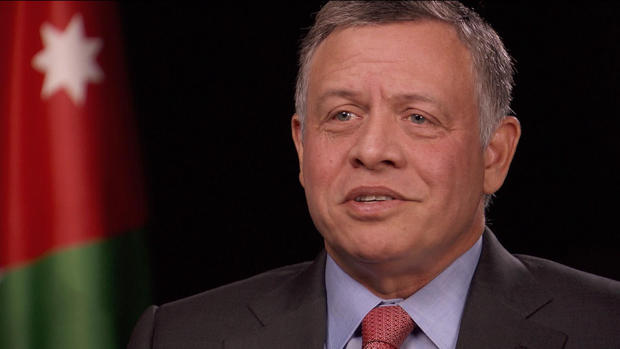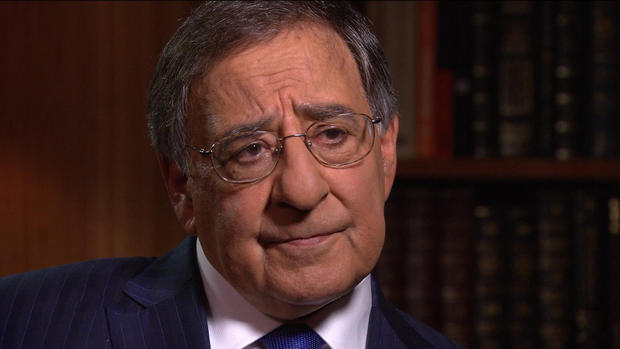The Islamic State: Repercussions
The following script is from the second part "The Islamic State" which aired on Sept. 21, 2014. The correspondent is Scott Pelley. Henry Schuster and Nicole Young, producers.
President Obama's plan hinges on arming and training moderate Syrian militias to defeat ISIS. The president has been criticized for not doing that sooner. You're about to hear from two men who saw the threat early, former Defense Secretary Leon Panetta and King Abdullah II of Jordan.
Jordan is a moderate, American ally, nearly surrounded by war, with the Israeli-Palestinian conflict to its west, Syria to its north and Iraq to the east.
Today we spoke to King Abdullah in New York before this month's U.N. General Assembly meeting. For hundreds of years, his family ruled the holiest shrines in Islam. And the king was nearly at a loss for words today when we asked him about the head of ISIS, who claims to lead all Muslims.
King Abdullah II: I hate to use the word "heretics," whatever the words of those types are, but to even call himself a Muslim is to me is just words that I don't want to use on this program.
Scott Pelley: You just used the word "heretic," is he an Islamic heretic?
King Abdullah II: I think to use the word "Islam" and him in the same sentence is not acceptable. That he even speaks in the name of Islam for me is just so horrendous and so shocking.
The Kingdom of Jordan has borne the burden of the Syrian civil war even though it has no oil wealth and precious little water. We went to the border where, for three years, refugees from that war have risked death in the desert in the hope of reaching Jordan, where they are welcomed.
Scott Pelley: We caught up with this group of refugees inside Syria as they made the last mile to the berm that marks the border with Jordan. There are hundreds just like them every day, thousands every month.
"They could have been prevented if the international community worked harder together..."
Jordan is now host to vast refugee camps, which have become cities in the desert.
King Abdullah II: It's the right thing to do, I mean, where else would the Syrians go? They're in dire straits, that's why today we have 1.4 million Syrian refuges in our country 20 percent or slightly more of our population.
Scott Pelley: Twenty percent of the population are refuges from outside the country?
King Abdullah II: Equivalent of probably 60 million refugees in your country, as we speak.
Scott Pelley: How long can you manage that?
King Abdullah II: I think we are at the limit actually, and with the difficult economic conditions we're in, it's a tremendous burden on our country.
Scott Pelley: Have your troops been engaged with ISIS? Do you think of your borders secure?
King Abdullah II: We have retaliated to several contacts over the past several months to those who have come across our borders or tried to come across our borders. So we have been somewhat aggressive to make sure our borders are defended.
Scott Pelley: Are your borders secure?
King Abdullah II: Our borders are extremely secure.
King Abdullah told us forcing ISIS out of Iraq is the easier part. But he estimates digging it out of its base in eastern Syria could take two years. He supports U.S. airstrikes as essential to overpowering ISIS.
King Abdullah II: The difference with ISIS, I think, compared to any other organization, is that they are self financing. They can produce within a year, in a year cycle, up to almost a billion dollars worth of oil derivatives, that they are obviously selling at a low price about $30 a barrel. Which means they can pay a lot of foreign fighters come to their country. They can buy weapons.
Scott Pelley: Would a billion dollars a year give them a seat in OPEC?
King Abdullah II: You would imagine, if you had that capability which I, what they have to have is about a third of the production of the United Arab Emirates, in a way technically, they'd be asking for a seat in OPEC.
Now, according to the king, all countries in the region face a choice.
King Abdullah II: ISIS, I think, has triggered an understanding that its time for all of us to make up our minds on the fight of good against evil. And this brings all of us together from all religions of different sides of the divide. Are we going to fight the good fight?
Scott Pelley: Could the rise of ISIS have been prevented?
King Abdullah II: They could have been prevented if the international community worked harder together to make sure funding and support to the original groups in Syria were not allowed to get to the extent that they were.
"I think they are a threat. I think they're as dangerous ... as Al Qaeda was."
Scott Pelley: The international community, the United States intervened too late?
King Abdullah II: I think we could have done a better job in making sure that earlier on it was identified who the bad people were and action by the international community was taken not to allow that to happen.
It turns out President Obama was urged to intervene in Syria much earlier. In a new book, "Worthy Fights," former Defense Secretary Leon Panetta writes that, in a meeting in the fall of 2012 he, Secretary of State Hillary Clinton, the director of the CIA and the chairman of the Joint Chiefs all urged the President Obama to arm moderate Syrians who had started the revolution against the dictatorship to begin with. That might have left no room for ISIS to grow.
Leon Panetta: The real key was how could we develop a leadership group among the opposition that would be able to take control. And my view was, to have leverage to do that, we would have to provide the weapons and the training in order for them to really be willing to work with us in that effort.
Scott Pelley: But with virtually his entire national security team unanimous on this, that's not the decision the president made.
Leon Panetta: I think the president's concern, and I understand it, was that he had a fear that if we started providing weapons, we wouldn't know where those weapons would wind up. My view was: You have to begin somewhere.
Scott Pelley: In retrospect now, was not arming the rebels at that time a mistake?
Leon Panetta: I think that would've helped. And I think in part, we paid the price for not doing that in what we see happening with ISIS.
Now ISIS has forced Mr. Obama to reverse himself. The new policy depends on local forces to win on the ground, but many of the available partners are dubious. Syrian rebels fight each other. And the Pentagon figures only about half the Iraqi army is reliable.
But, at the same time, ISIS has problems of its own. Its advance is running into heavy opposition now. In the north, we found Kurdish troops holding the line backed by U.S. airstrikes.
[Peshmerga solder: Thank you America, thank you Obama, thank you American military.]
To the east and south, ISIS has come up against the opposing Shiite population. Most of Baghdad is Shiite. If ISIS has reached its borders, the concern for America now is what will it export.
Scott Pelley: When we see these ISIS soldiers on these videos say, "We're coming for you, America." Is that idle boasting? Or are they a threat here at home?
Leon Panetta: I think they are a threat. I think they're as dangerous, as fanatical as terrorist as Al Qaeda was. And they have a large number of foreign fighters with foreign passports that make them particularly dangerous to the safety of this country.
Scott Pelley: How long does it take to destroy ISIS?
Leon Panetta: I think it's going to take a long time. And I think the American people need to know it's going to take a long time.
It's been a long time already. U.S. forces attacked Iraq in 1991 and were engaged on the ground or in the air for 21 years. The latest effort begins where Lieutenant Mohammad is holding the bridge to Kirkuk. Each American campaign began like a journey on a bridge. Straight, narrow, clearly defined until it reached the enemy.
Continue with Scott Pelley's reports, "The Islamic State: On the ground in Iraq."


